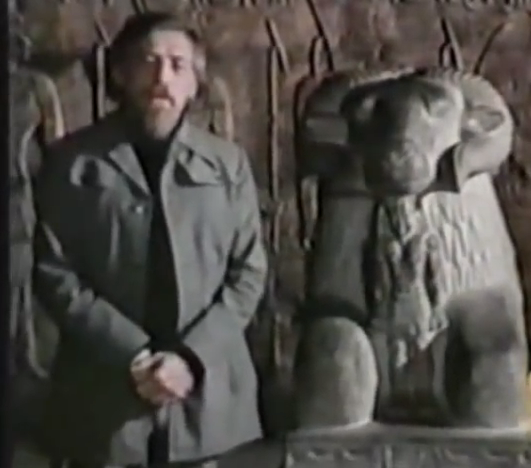Nimoy's opening here is all about space and the possibility of life on other planets. Its important to remember that the first man on the moon happened less than 9 years before this episode aired. Nimoy hints at something amazing that happened in 1976. Is it the Viking mission to Mars?
Now we are getting a bit of an astronomy lesson on the origins of the sun in our solar system as well as the other right planets.
"The planets were the cinders left by this cosmic holocaust." Pure poetry once again from Nimoy. His point is clear. If life could start on Earth, there are infinite possibilities for life to exist on other planets.
Next we hear about one of my favorite films of all time! "A Trip to the Moon" from filmmaker Georges Méliès was one of the first films ever made in 1902. With it came the birth of science fiction filmmaking. Nimoy discusses how Méliès depicts an encounter with aliens.
Nimoy's point here is to bring up how humans have wondered about a possible encounter with aliens with hope and fear for a very long time. Will humans ever have such an encounter? Has it already happened?
The film is wonderful, but a curiously long time is spent showing scenes from this film. Nimoy then moves on to Percival Lowell who became famous for pointing out what he thought were canals on Mars. Canals built by aliens perhaps?
 |
| (Percival Lowell) |
Lowell installed the most advance telescope ever made in 1894 in Arizona and made his observations of Mars. Nimoy tells us the observatory he built is still being used today. It goes without saying, of course, that Lowell's canal theory has been discredited by mainstream astronomy. Turns out Lowell had a bunch of other theories about Mars that we have been able to prove he was likely right about. Things about the oceans being there at one time and the stage Mars was in as a planet.
In a foreboding tone, Nimoy tells us that Lowell believed the same forces that caused Mars to lose it's "life-giving" oceans were already at work on the Earth. Then Nimoy throws out the weird idea. "Could it be that some Martian scientist was able to warn his people in time?" What if it was a woman scientist?
Now for some modern science. We are introduced to an astronomer named Harold Klein who is studying this very issue.
 |
| (Harold Klein) |
Klein lets us know that the theory is that Mars and Earth were created at the same time, and that at one time Mars had water and a very similar land as the Earth. Now we get to hear from Mars Geologist Gerald Soffen. Soffen wants to make it clear to us that water was present on both planets even though there is no water there today.
 |
| (Gerald Soffen) |
They really want us to think that there was life on Mars at one time. This may very have been true. Nimoy tells us about the Viking mission launched in 1975. This probe was bound for Mars. We are told that this mission has provided men with their first look at the Mars surface close up.
 |
| (image from the Viking mission) |
"There are three schools of thought. Some believe I slight tilt in the Earth's axis is bringing on a new ice age. Others feel the Earth 's climate is drying and the deserts are slowly encroaching on population centers. Another view is that men have so altered the natural environment no once can predict the future." Is this about climate change or Martians? Pollution and the advent of nuclear weapons are all talked about as reason why men may alter the Earth. Nimoy points out that Viking has discovered no life or sign of life, but that maybe life was destroyed and the remnants of life are somewhere else on the planet? Nimoy even wonders if Martians figured it out and abandoned their planet. Now we finally get the weird part and its only a tidbit... Nimoy wonders if Martians from Mars came to Earth and that we are all just really Martians. Its an interesting idea and he's not the only one to throw it out there. I find it interesting that he waited until the last 3 minutes to mention it.
"Albert Einstein believed the Universe was shaped like a saddle . By travelling in a straight line, one could eventually wind up where he startted. With the universe, as with life, endings seem to merge with beginnings."
Nimoy wonders if we might return to Mars and maybe even re-settle it? This episode is "ok". Its not as boring as the killer bees or as crazy as the talking plants. But once again, the lack of creepiness just makes it feel like a science special on PBS or something.
I will admit, though, Mars was much more unusual and strange to folks watching in 1977.
You can watch this episode "Martians" below.





















































